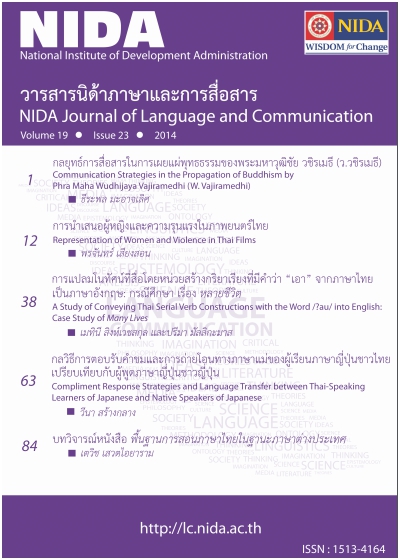Compliment Response Strategies and Language Transfer between Thai-Speaking Learners of Japanese and Native Speakers of Japanese
Keywords:
compliment responses, language transfer, speed act, Thai-speaking learners of JapaneseAbstract
This research studies a comparison of compliment response strategies, including the social factors affecting the choice of expression made for a response to compliments among Thai-speaking learners of Japanese and native speakers of Japanese. Concurrently, this study also examines language transfer between Thai-speaking learners of Japanese and native speakers of Thai. The data was collected from participants of a conversation questionnaire into the process of acquiring compliment response strategies of each of the sampling groups; as well, the levels of language transfer amongst Thai-speaking learners of Japanese was appraised. The results of the study reveal that Thai-speaking learners of Japanese and native speakers of Thai use compliment accepting strategies most often. In contrast, native speakers of Japanese use compliment evasion strategies most often. In addition, it was found that three of the sampling groups used the sub-strategy of appreciation, saying thank you to a compliment, most frequently; however, there was difference amongst the participants in the way the strategies were engaged. For example, the second most frequently used sub-strategy was that of Thai-speaking learners of Japanese using disagreement strategies. Native speakers of Japanese used compliment devaluing strategies, and native speakers of Thai used recommendation strategies and describing strategies. Finally, the results relating to social factors show that Thai-speaking learners of Japanese use fewer expressions in compliment responses than native speakers of Japanese and native speakers of Thai. Moreover, the site factor for compliment responses had the least influence compared with other factors. For example, it was found that differences in language transfer were related to Japanese language proficiency levels and experience of living in Japan or interaction with the Japanese language.Downloads
How to Cite
Issue
Section
License
By submitting a manuscript, the author transfers the copyright for the article to School of Language and Communication, National Institute of Development Administration (NIDA), if and when the manuscript is accepted for publication. Though the journal is an open-access, reproduction of any material published in NIDA Journal of Language and Communication for non-personal and/or commercial purpose requires a written permission from School of Language and Communication, National Institute of Development Administration (NIDA).






